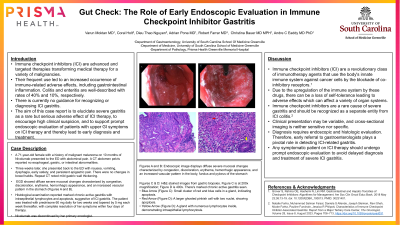Monday Poster Session
Category: Stomach
P2835 - Gut Check: The Role of Early Endoscopic Evaluation in Immune Checkpoint Inhibitor Gastritis
Monday, October 23, 2023
10:30 AM - 4:15 PM PT
Location: Exhibit Hall

Has Audio
- VM
Varun Moktan, MD
Prisma Health-Upstate
Greenville, SC
Presenting Author(s)
Varun Moktan, MD1, Adrian Pona, MD2, Coral Holt, BS1, Dieu Thao Nguyen, 3, Christina M. Bauer, MD, MPH1, Andre Eaddy, MD, PhD1
1Prisma Health-Upstate, Greenville, SC; 2Prisma Health, Greenville, SC; 3University of South Carolina, Greenville, SC
Introduction: Immune checkpoint inhibitors (ICI) are advanced and targeted therapies transforming medical therapy for a variety of malignancies. However, their frequent use led to an increased occurrence of immune-related adverse effects, including gastrointestinal inflammation. Colitis and enteritis are well-described with rates of 40% and 10%, respectively. Although oncologists routinely monitor for enterocolitis symptoms, there is currently no guidance for recognizing or diagnosing ICI gastritis. The aim of this case report is to elucidate severe gastritis as a rare but serious adverse effect of ICI therapy, to encourage high clinical suspicion, and to support prompt endoscopic evaluation of patients with upper GI symptoms on ICI therapy and thereby lead to early diagnosis and treatment.
Case Description/Methods: A 71-year-old female with a history of malignant melanoma on 10 months of Nivolumab presented to the ED with abdominal pain. A CT abdomen pelvis reported no esophageal, gastric, or intestinal abnormalities. Three weeks later, she presented back to the ED with nausea, vomiting, dysphagia, early satiety, and persistent epigastric pain. There were no changes in bowel habits. Repeat CT noted mild gastric wall thickening. An EGD was performed reporting diffuse severe mucosal changes characterized by congestion, discoloration, erythema, hemorrhagic appearance, and an increased vascular pattern in the stomach (Figures A and B). Histological examination revealed marked chronic active gastritis with intraepithelial lymphocytes and apoptosis, suggestive of ICI gastritis. The patient was treated with prednisone 60 mg daily for two weeks and tapered by 5 mg each week thereafter, with complete resolution of her symptoms within four days of therapy. Nivolumab was discontinued by her primary oncologist.
Discussion: As ICI are increasingly used for multiple malignancies, healthcare providers will experience more cases of ICI adverse effects. Immune checkpoint inhibitors are a rare cause of severe gastritis and should be recognized as a separate entity from ICI colitis. Clinical presentation may be variable, and cross-sectional imaging is neither sensitive nor specific. Diagnosis requires endoscopic and histologic evaluation. Therefore, early referral to gastroenterologists plays a pivotal role in detecting ICI-related gastritis. Patients with upper gastrointestinal symptoms on ICI therapy should undergo prompt endoscopic evaluation to avoid delayed diagnosis and treatment of severe ICI gastritis.

Disclosures:
Varun Moktan, MD1, Adrian Pona, MD2, Coral Holt, BS1, Dieu Thao Nguyen, 3, Christina M. Bauer, MD, MPH1, Andre Eaddy, MD, PhD1. P2835 - Gut Check: The Role of Early Endoscopic Evaluation in Immune Checkpoint Inhibitor Gastritis, ACG 2023 Annual Scientific Meeting Abstracts. Vancouver, BC, Canada: American College of Gastroenterology.
1Prisma Health-Upstate, Greenville, SC; 2Prisma Health, Greenville, SC; 3University of South Carolina, Greenville, SC
Introduction: Immune checkpoint inhibitors (ICI) are advanced and targeted therapies transforming medical therapy for a variety of malignancies. However, their frequent use led to an increased occurrence of immune-related adverse effects, including gastrointestinal inflammation. Colitis and enteritis are well-described with rates of 40% and 10%, respectively. Although oncologists routinely monitor for enterocolitis symptoms, there is currently no guidance for recognizing or diagnosing ICI gastritis. The aim of this case report is to elucidate severe gastritis as a rare but serious adverse effect of ICI therapy, to encourage high clinical suspicion, and to support prompt endoscopic evaluation of patients with upper GI symptoms on ICI therapy and thereby lead to early diagnosis and treatment.
Case Description/Methods: A 71-year-old female with a history of malignant melanoma on 10 months of Nivolumab presented to the ED with abdominal pain. A CT abdomen pelvis reported no esophageal, gastric, or intestinal abnormalities. Three weeks later, she presented back to the ED with nausea, vomiting, dysphagia, early satiety, and persistent epigastric pain. There were no changes in bowel habits. Repeat CT noted mild gastric wall thickening. An EGD was performed reporting diffuse severe mucosal changes characterized by congestion, discoloration, erythema, hemorrhagic appearance, and an increased vascular pattern in the stomach (Figures A and B). Histological examination revealed marked chronic active gastritis with intraepithelial lymphocytes and apoptosis, suggestive of ICI gastritis. The patient was treated with prednisone 60 mg daily for two weeks and tapered by 5 mg each week thereafter, with complete resolution of her symptoms within four days of therapy. Nivolumab was discontinued by her primary oncologist.
Discussion: As ICI are increasingly used for multiple malignancies, healthcare providers will experience more cases of ICI adverse effects. Immune checkpoint inhibitors are a rare cause of severe gastritis and should be recognized as a separate entity from ICI colitis. Clinical presentation may be variable, and cross-sectional imaging is neither sensitive nor specific. Diagnosis requires endoscopic and histologic evaluation. Therefore, early referral to gastroenterologists plays a pivotal role in detecting ICI-related gastritis. Patients with upper gastrointestinal symptoms on ICI therapy should undergo prompt endoscopic evaluation to avoid delayed diagnosis and treatment of severe ICI gastritis.

Figure: A. Body of stomach
B. Fundus of stomach
B. Fundus of stomach
Disclosures:
Varun Moktan indicated no relevant financial relationships.
Adrian Pona indicated no relevant financial relationships.
Coral Holt indicated no relevant financial relationships.
Dieu Thao Nguyen indicated no relevant financial relationships.
Christina Bauer: Abbvie – Speakers Bureau. Pfizer – Advisory Committee/Board Member.
Andre Eaddy indicated no relevant financial relationships.
Varun Moktan, MD1, Adrian Pona, MD2, Coral Holt, BS1, Dieu Thao Nguyen, 3, Christina M. Bauer, MD, MPH1, Andre Eaddy, MD, PhD1. P2835 - Gut Check: The Role of Early Endoscopic Evaluation in Immune Checkpoint Inhibitor Gastritis, ACG 2023 Annual Scientific Meeting Abstracts. Vancouver, BC, Canada: American College of Gastroenterology.
